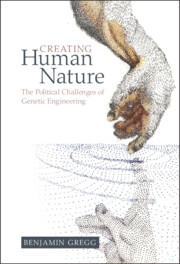Book contents
- Creating Human Nature
- Creating Human Nature
- Copyright page
- Dedication
- Contents
- Acknowledgments
- Introduction
- Part I The Political Bioethics of Regulating Genetic Engineering
- 1 Regulation Guided by Proceduralism
- 2 Regulation Guided by Less-than-Universal Standards
- 3 Regulation Guided by Human Nature as Construction, Not Essence
- 4 Regulation Guided by Human Dignity as Decisional Autonomy, Not Essence
- Part II The Political Dimensions of Engineering Intelligence
- Part III Inequality as an Unintended Consequence Locally and as a Planetary Phenomenon
- References
- Index
2 - Regulation Guided by Less-than-Universal Standards
from Part I - The Political Bioethics of Regulating Genetic Engineering
Published online by Cambridge University Press: 13 October 2022
- Creating Human Nature
- Creating Human Nature
- Copyright page
- Dedication
- Contents
- Acknowledgments
- Introduction
- Part I The Political Bioethics of Regulating Genetic Engineering
- 1 Regulation Guided by Proceduralism
- 2 Regulation Guided by Less-than-Universal Standards
- 3 Regulation Guided by Human Nature as Construction, Not Essence
- 4 Regulation Guided by Human Dignity as Decisional Autonomy, Not Essence
- Part II The Political Dimensions of Engineering Intelligence
- Part III Inequality as an Unintended Consequence Locally and as a Planetary Phenomenon
- References
- Index
Summary
Genetic engineering refers to the genetic editing of living systems – to the specific addition, removal, or modification of DNA sequences, for example to correct a particular gene’s defective functioning in a specific biological context. Genetic engineering targets somatic cells, germ cells, and embryos.1 Although genome editing by these new tools does not generate fundamental biological risks not already generated by previously available technologies, it is easier, quicker, more precise, and more powerful. Unlike them, the new techniques constitute a socially disruptive science and technology by posing profound and difficult moral issues, such as the moral evaluation of our species editing its own genome. The term disruption refers to challenges that can only be addressed politically: weighing the benefits and risks of genetic engineering is a political endeavor, not a scientific or technical one. As such, ordinary members of a political community should not abdicate all decision-making to experts in the natural sciences, the social sciences, medicine, or ethics – or, as Chapter 6 urges, to artificial intelligence. After all, such experts are not elected and cannot represent citizens, let alone particular cultural and political commitments. Different cultural and political commitments invite different problem-solving approaches, and complex modern societies are marked by significant value pluralism. The political goal of broadly shared agreement on how best to regulate human genetic manipulation is difficult already at the national level. More than a few observers call for agreement on a global level.
- Type
- Chapter
- Information
- Creating Human NatureThe Political Challenges of Genetic Engineering, pp. 42 - 61Publisher: Cambridge University PressPrint publication year: 2022

